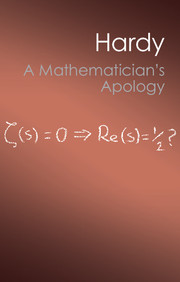22
Published online by Cambridge University Press: 05 August 2014
Summary
There is another misconception against which we must guard. It is quite natural to suppose that there is a great difference in utility between ‘pure’ and ‘applied’ mathematics. This is a delusion: there is a sharp distinction between the two kinds of mathematics, which I will explain in a moment, but it hardly affects their utility.
How do pure and applied mathematics differ from one another? This is a question which can be answered definitely and about which there is general agreement among mathematicians. There will be nothing in the least unorthodox about my answer, but it needs a little preface.
My next two sections will have a mildly philosophical flavour. The philosophy will not cut deep, or be in any way vital to my main theses; but I shall use words which are used very frequently with definite philosophical implications, and a reader might well become confused if I did not explain how I shall use them.
I have often used the adjective ‘real’, and as we use it commonly in conversation. I have spoken of ‘real mathematics’ and ‘real mathematicians’, as I might have spoken of ‘real poetry’ or ‘real poets’, and I shall continue to do so. But I shall also use the word ‘reality’, and with two different connotations.
- Type
- Chapter
- Information
- A Mathematician's Apology , pp. 121 - 124Publisher: Cambridge University PressPrint publication year: 2012



